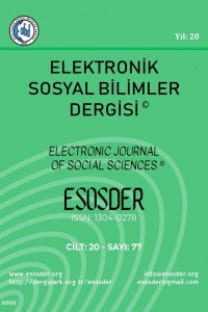GERCEGE UYGUN DEGER MUHASEBESİ'NİN BULGARİSTAN VE ARNAVUTLUK'TA ADAPTASYONU VE FİRMALARİN EKONOMİK PERFORMANSLARİNA ETKİLESİMİ
Bu çalışmanın amacı, (1) Arnavutluk ve Bulgaristan'da, gerçeğe uygun değer muhasebesi'nin (FVA) degisik katmandaki sirketlerde benimsenmesi ve kamu şirketlerinin performanslarina etkisinin oldugunu uygun şekilde eşleştirilmiş örneklerle ve su finansal oranlarla gozlemlemek: Aktif getirisi orani (ROA), özkaynak getirisi orani (ROE), likidite oranı ve özsermaye oranı. (2) Bir ara değişken olarak yatiriminin gerçeğe uygun değer muhasebesinin kullanımına istekliligini test etmek. İstatistiksel testler gercege uygun muhasebenin adaptasyonu sureceinde ortaya cikan degiskenliklerin, Aktif getirisi orani (ROA), özkaynak getirisi orani (ROE), likidite oranı, özsermaye oranıdaki performans degiskenliklerle ilgisi olmadigini gostermektedir. Sonuç olarak gercege uygun muhasebenin Arnavutluk ve Bulgaristan'da kullanimi yatirim kararlarinin alinmasinda henuz etkin degildir.
Anahtar Kelimeler:
Gerçeğe uygun muhasebe, Aktif getirisi oranı, öz kaynak getirisi oranı, likidite oranı, öz sermaye oranı.
FAIR VALUE ACCOUNTING (FVA) ADOPTION AND ITS INTERACTION WITH COMPANIES' ECONOMIC PERFORMANCEIN BULGARIA AND ALBANIA
Abstract The purpose of this study was to show an appropriately stratified and matched sample of public companies from Albania and Bulgaria and to (1) determine whether, , the adoption of fair value accounting (FVA) was associated with improved company performance as measured by four common financial ratios: return on assets (ROA), return on equity (ROE), quick ratio, and debt to equity ratio and (2) test investor enthusiasm about the use of fair value accounting as an intermediate variable. Statistical testing revealed that variation in FVA adoption was not associated with variation in ROA, ROE, quick ratio, and debt to equity ratio performance, and that investors were rarely aware of the use of FVA. The conclusion was that FVA use has not yet been factored into investment decisions made in Albania and Bulgaria. Keywords: Fair value accounting, ROA, ROE, quick ratio, debt to equity. JEL codes: M41
Keywords:
Fair value accounting, ROA, ROE, quick ratio, debt to equity.,
___
- Bahmani-Oskoee, M. & Kutan, A.M. (2009). The J-curve in the emerging economies of Eastern Europe. Applied Economics, 41(20), 2523-2532.
- Barlev, B. & Haddad, J.R. (2003). Fair value accounting and the management of the firm. Critical Perspectives on Accounting, 14(4), 383-415.
- Figlewski, S. (1982). Information diversity and market behavior. The Journal of Finance, 37(1), 87-102. Cline, W.R. (2010). Financial globalization, economic growth, and the crisis of 2007-09. Washington, D.C.: Peterson Institute.
- Dick, W. & Missionier-Piera, F. (2010). Financial reporting under IFRS: A topic-based approach. New York, NY: John Wiley & Sons.
- Palepu, K.G., Healy, P.M., Peek, E., & Bernard, V.L. (2007). Business analysis and valuation. New York, NY: Cengage.
- Previts, G.J., Walton, P., & Wolnizer, P. (2011). A global history of accounting, financial reporting, and republic policy. New York, NY: Emerald Group Publishing.
- Saudagaran, S.M. (2009). International accounting: A user perspective. New Delhi, India: CCH.
- World Bank. (2012). Development indicators. Retrieved from http://data.worldbank.org
- Zack, G.M. (2009). Fair value accounting fraud: New global risks and detection techniques. New York, NY: John Wiley & Sons.
- ISSN: 1304-0278
- Yayın Aralığı: Yılda 4 Sayı
- Başlangıç: 2002
- Yayıncı: Cahit AYDEMİR
Sayıdaki Diğer Makaleler
İbrahim Hakan KARATAŞ, Ömer Faruk SÖZCÜ
DİJİTAL YERLİLER, DİJİTAL GÖÇMENLER VE SINIF YÖNETİMİ
MESLEK LİSELERİNDE TÜRK DİLİ VE EDEBİYATI EĞİTİMİ: BİR DURUM ÇALIŞMASI
TUNUS'TA ARAP BAHARI: LİBERAL DEMOKRATİK BİR GEÇİŞ
Başak Akar YÜKSEL, Yılmaz BİNGÖL
Faysal OKUMUŞ, Mehmet METE, Erlan BAKİYEV, İlhan KAÇİRE
ÇAPAKÇÛR KÖPRÜSÜ GEÇİŞ MUKATAASI ÜZERİNE BAZI TESPİTLER
Meltem Nurtaniş VELİOĞLU, Süreyya KARSU, Sertaç ÇİFCİ, Pınar Ayranci IŞIKHAN, Meftune Özbakir UMUT
ÖĞRENCİ DEVAMSIZLIKLARININ EĞİTİM DENETMENLERİNİN GÖRÜŞLERİNE GÖRE DEĞERLENDİRİLMESİ
